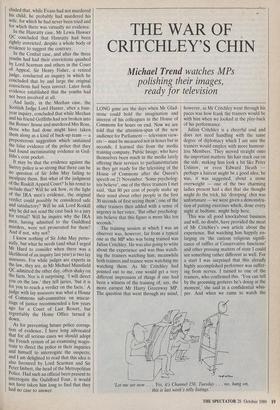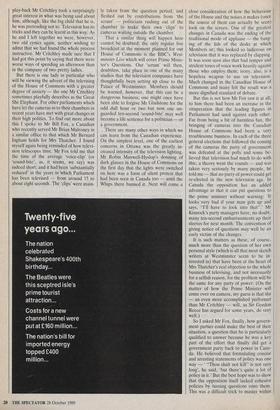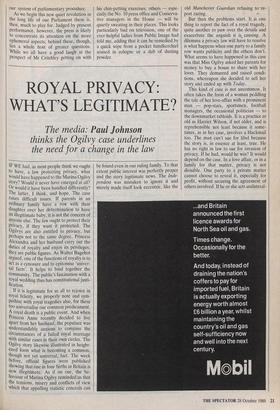THE WAR OF CRITCHLEY'S CHIN
Michael Trend watches MPs
polishing their images, ready for television
LONG gone are the days when Mr Glad- stone could hold the imagination and interest of his colleagues in the House of Commons for hours on end. Now we are told that the attention-span of the new audience for Parliament — television view- ers — must be measured not in hours but in seconds. I learned this from the media training company, Public Image, who have themselves been much in the media lately offering their services to parliamentarians as they get ready for the televising of the House of Commons after the Queen's speech on 21 November. 'Some psycholog- ists believe', one of the three trainers I met said, 'that 80 per cent of people make up their mind about other people in the first 30 seconds of first seeing them'; one of the other trainers then added with a sense of urgency in her voice, 'But other psycholog- ists believe that this figure is more like ten seconds.'
The training session at which I was an observer was, however, far from a typical one as the MP who was being trained was Julian Critchley. He was also going to write about the experience and was thus watch- ing the trainers watching him; meanwhile both trainers and trainee were watching me watching them. As Mr Critchley had pointed out to me, one would get a very different impression of things if one had been a witness of the training of, say, the more earnest Mr Harry Greenway MP. The question that went through my mind, however, as Mr Critchley went through his paces was how frank the trainers would be with him when we looked at the play-back of his performance.
Julian Critchley is a cheerful soul and does not need handling with the same degree of diplomacy which I am sure the trainers would employ with more humour- less Members. They moved straight onto the important matters: his hair stuck out on the side, making him look a bit like Peter Ustinov, or even Edward Heath perhaps a haircut might be a good idea; he was, it was suggested, about a stone overweight — one of the two charming ladies present had a diet that she thought might do the trick; his 'drooping' chin was unfortunate — we were given a demonstra- tion of patting exercises which, done every night at bedtime, might help here.
This was all good knockabout business and will, no doubt, have provided the meat of Mr Critchley's own article about the experience. But watching him happily en- larging on `the curious religious signifi- cance of raffles at Conservative functions' and other pressing matters of state I could see something rather different as well. For a start I was surprised that this already highly accomplished performer was suffer- ing from nerves. I turned to one of the trainers, who confirmed this. 'You can tell by the grooming gestures he's doing at the moment,' she said in a confidential whis- per. And when we came to watch the 'Let me see now . . . Yes, it's Channel 150, Tuesday . . no, hang on, this is last week's telly listings.' play-back Mr Critchley took a surprisingly great interest in what was being said about him, although, like the big child that he is, he was pretending not to. Television has its tricks and they can be learnt in this way. As he and I left together we were, however, two old cynics again, neither wishing to admit that we had found the whole process instructive. Mr Critchley made sure that I had got this point by saying that there were worse ways of spending an afternoon than in the company of two pretty ladies.
But there is one lady in particular who will be viewing the advent of the televising of the House of Commons with a greater degree of anxiety — the one Mr Critchley sometimes playfully describes as the Great She Elephant. For other parliaments which have let the cameras in to their chambers in recent years have met with great changes in their high politics. To find out more about this I spoke to Mr Bill Fox, a Canadian who recently served Mr Brian Mulroney in a similar office to that which Mr Bernard Ingham holds for Mrs Thatcher. I found myself again being reminded of how televi- sion telescopes time. Mr Fox told me that the time of the average 'voice-clip' (or 'sound-bite', as, it seems, we say) was indeed short; and it had been 'substantially reduced' in the years in Which Parliament has been televised — from around 15 to about eight seconds. The 'clips' were main-
ly taken from the question period, and fleshed out by contributions from 'the scrum' — politicians rushing out of the chamber to make their own 'clips' to cameras waiting outside the chamber.
That a similar thing will happen here cannot be doubted: the only regular live broadcast at the moment planned for our House of Commons is the BBC's West- minster Live which will cover Prime Minis- ter's Questions. Our 'scrum' will then, doubtless, take place in one of the many studios that the television companies have thoughtfully been setting up close to the Palace of Westminster. Members should be warned, however, that this can be a dangerous business; one might once have been able to forgive Mr Gladstone for the odd dull hour or two but now one un- guarded ten-second 'sound-bite' may well become a life sentence for a politician — or a government.
There are many other ways in which we can learn from the Canadian experience. On the simplest level, one of the earliest concerns in Ottawa was the greatly in- creased intensity of the television lighting. Mr Robin Maxwell-Hyslop's donning of dark glasses in the House of Commons on the first day that the lights were switched on here was a form of silent protest that had been seen in Canada too — until the Whips there banned it. Next will come a close consideration of how the behaviour of the House and the noises it makes (once the source of them can actually be seen) look on the screen. One of the greatest changes in Canada was the ending of the traditional mode of applause — the bang- ing of the lids of the desks at which Members sit; this looked so ludicrous on television that it was replaced by clapping. It was soon seen also that bad temper and strident tones of voice work heavily against those who employ them; irony, also, is a hopeless weapon to use on television. Much changed in the Canadian House of Commons and many felt the result was a more dignified standard of debate.
But this is not how Mr Fox saw it at all; to him there had been an increase in the vituperation that the leading figures in Parliament had used against each other. Far from being a bit of harmless fun, the bringing of cameras into the Canadian House of Commons had been a very troublesome business. In each of the three general elections that followed the coming of the cameras the party of government was defeated at the polls and some be- lieved that television had much to do with this; a theory went the rounds — and was taken very seriously by many people, he told me — that no party of power could get re-elected in the new television age. In Canada the opposition has an added advantage in that it can put questions to the prime minister without warning: 'It looks very bad if your man gets up and says, "I'll have to look into that".' Mr Kinnock's party managers have, no doubt, many ten-second embarrassments up their sleeves for next month. The convention of giving notice of questions may well be an early victim of the changes.
It is such matters as these, of course, much more than the question of her own personal style (which is all that most sketch writers at Westminster seem to he in- terested in) that have been at the heart of Mrs Thatcher's real objection to the whole business of televising, and not necessarily for a selfish reason, for the problem will be the same for any party of power. (On the matter of how the Prime Minister will come over on camera, my guess is that she — an even more accomplished performer than Mr Critchley — will, as Sir Gordon Reece has argued for some years, do very well.)
So I asked Mr Fox, finally, how govern- ment parties could make the best of their situation, a question that he is particularly qualified to answer because he was a key part of the effort that finally did get a government party back to power in Cana- da. He believed that formulating concise and arresting statements of policy was one way — ' "Thou shalt not kill" is not very long', he said, 'but there's quite a lot of policy in it.' But the best hope was to show that the opposition itself lacked cohesive policies by turning questions onto them. This was a difficult trick to master within
our system of parliamentary procedure.
As we begin this new quiet revolution in the long life of our Parliament there is, then, much to play for. Judged by present performance, however, the press is likely to concentrate its attention on the more ephemeral aspects; behind these, though, lies a whole host of greater questions. While we all have a good laugh at the prospect of Mr Critchley getting on with his chin-patting exercises, others — espe- cially the No. 10 press office and Conserva- tive managers in the House — will be quietly sweating in their places. This looks particularly bad on television, one of the ever-helpful ladies from Public Image had told me, adding that it can be remedied by a quick wipe from a pocket handkerchief soused in cologne or a dab of dusting powder.




































































 Previous page
Previous page